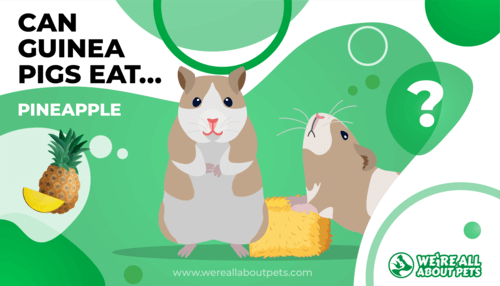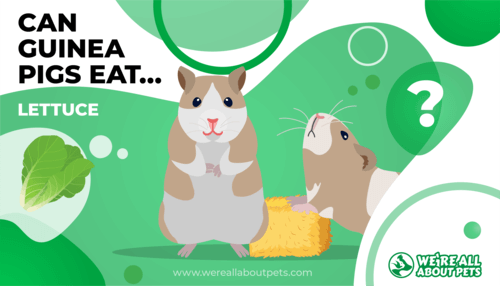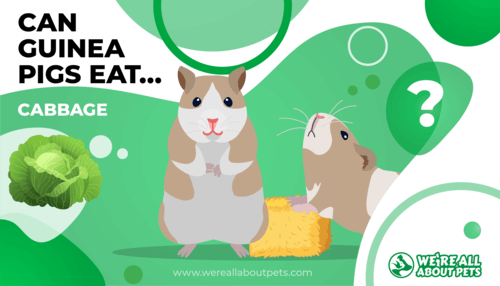Can Guinea Pigs Eat Oranges?
This page contains affiliate links. We may earn money or products from the companies mentioned in this post through our independently chosen links, which earn us a commission. Learn More
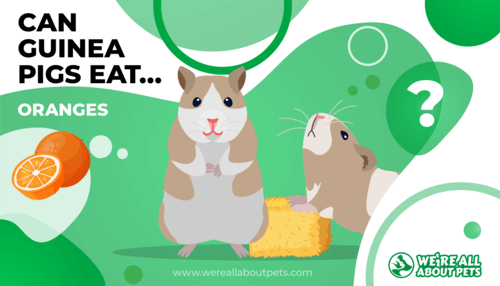
Just like us humans, guinea pigs aren’t capable of making their own vitamin C. This means it’s essential to supplement – and foods that area high in vitamin C can help your piggie thrive.
The question is, can guinea pigs have oranges? If so, how much orange can a guinea pig eat? And just how often can you give oranges to a guinea pig, anyway?
The good news is that guinea pigs can eat oranges. Before you run for the fridge though, there’s quite a bit more you should know.
Keep reading for the full scoop, and in a matter of minutes, you’ll know all there is to know about oranges for guinea pigs.
Orange Nutrition Stats
Even though they’re super sweet, oranges are great for you!
A satisfying one-cup serving of orange sections offers approximately:
- 85 calories
- 21 g carbohydrates
- 3 g fiber
- 7 g protein
- 2 g fat
Orange Nutritional Facts

Vitamin C isn’t all that oranges are good for. They’re also high in vitamin A, and they’re a surprisingly good source of minerals, too.
That same one-cup serving of orange gives you about:
- 8 mg vitamin C
- 405 iu vitamin A
- 326 mg potassium
- 72 mg calcium
- 18 mg magnesium
- .2 mg iron
- 3 mg vitamin E
- 54 mc folate
- 2 mg phosphorus
Can Guinea Pigs Have Oranges?
Yes, but you’ll need to be careful not to overdo it. Piggies don’t self-regulate and when they find a food that they really enjoy, they’re prone to overeating.
Are Oranges Good For Guinea Pigs?
Yes, oranges are very good for guinea pigs. You’ll still need to give your cavy the correct vitamin C enriched food but as healthy treats go, orange is at the top of the heap.
Do Guinea Pigs Like Oranges?
We’ve never met a guinea pig that didn’t like orange and it’s safe to say, this is probably one of the tastiest foods your guinea pig will ever eat. Don’t be surprised if you see your guinea pig popcorning a bit when you approach with some orange treats!
Of course, this probably won’t happen until your cavy knows what oranges are.
How Much Orange Can A Guinea Pig Eat?
Cover up your guinea pig’s ears because they might not like the answer to this question. When it comes to how much orange to give a guinea pig, our reply is “Not much!”
Here’s how much orange a to feed your guinea pig:
| Age | Amount |
| Baby guinea pig | None |
| Adult guinea pig | 1/8 of a medium orange |
Oranges get their tart, delicious flavor from acid – and too much acid can really harm your guinea pig’s digestive tract as well as the sensitive tissue around their mouth. In addition, guinea pigs really need to watch their sugar intake (well, we need to watch it for them!) since too much can cause serious digestive issues and diarrhea.
Too many sugary foods given over time can also lead to diabetes and obesity – two very unpleasant conditions that you don’t want to have your cavy suffer through!
When you first introduce oranges to your guinea pig, you’ll want to give them only a small portion – perhaps a teaspoon of fruit. Watch carefully over the next 12 hours or so.
If you don’t see signs of bloating, discomfort, or diarrhea, then you can gradually increase the amount of orange you give your cavy over time until they’re enjoying the full amount.
How Often Can A Guinea Pig Eat Oranges?
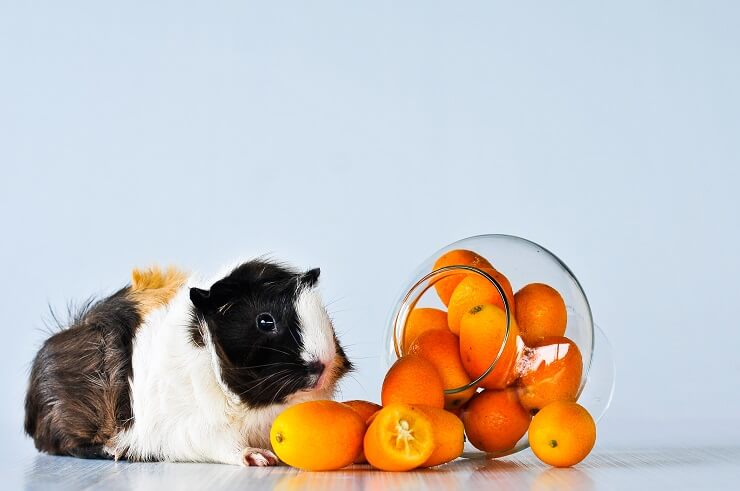
Since oranges are so sweet and so acidic, a little big goes a long way for guinea pigs! It’s best to offer oranges just once per week. Don’t give your cavy oranges on the same day that you offer other sweet or acidic snacks.
The Correct Diet is Important
Have you ever wondered what wild guinea pigs eat? As it turns out, wild cavies eat lots of different things.
Mostly, they nibble at low-lying plants and grasses. It isn’t likely that they’d ever encounter oranges in their natural environment but if they did, they’d probably take the opportunity to enjoy this very special snack.
Oranges shouldn’t be a big part of your guinea pig’s diet, but there are certain things they need every day.
Here’s what to feed your guinea pig:
- Unlimited amounts of fresh hay such as Timothy or oat, which is essential for the nibbling that helps keep your guinea pig’s teeth the right length. Nibbling hay also helps prevent boredom, and the long fibers help keep the digestive system moving.
- A serving of vitamin C fortified guinea pig food. Check the package to find the correct serving size for your cavy.
- One cup of fresh veggies, mostly greens and crunchy items. Split this into at least two smaller servings so that your guinea pig has a lower risk of suffering from diarrhea.
- Unlimited fresh water supply. Even if your guinea pig never finishes all of the water in their bottle, it’s important to rinse and refill at least once each day.
Last but not least, be sure that your guinea pig always has access to chewable items. Since your cavy’s teeth never stop growing, chewables such as apple wood sticks and hay cubes help prevent painful overgrowth.
What Are Other Healthy Alternatives To Oranges In A Guinea Pig’s Diet?
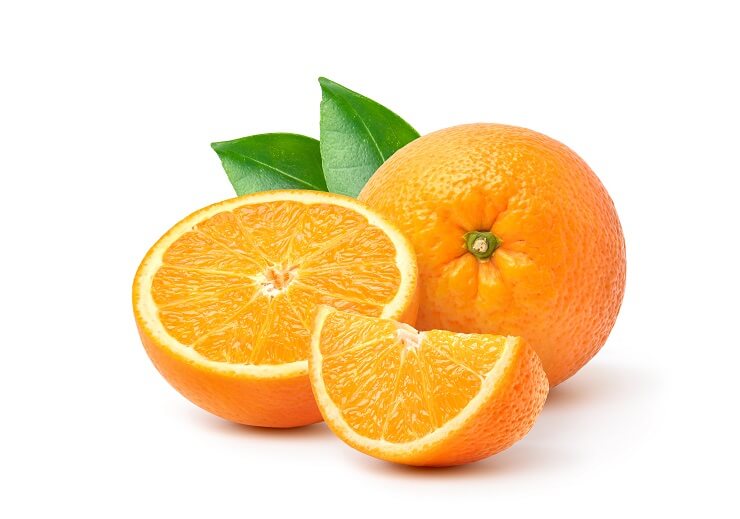
There are lots of different treats to offer your pet.
Here’s a list of guinea pig-approved veggies to help you get started with menu planning:
- asparagus
- artichoke
- basil
- cucumber
- bell pepper
- beets
- beet tops
- carrot
- carrot tops
- escarole
- cabbage
- summer squash
- parsnip
- cilantro
- mint
- parsley
- romaine
- pumpkin
- sweet potato
- broccoli
- broccolini
- watercress
- arugula
- swiss chard
- spinach
- endive
- butter lettuce
- buttercrunch lettuce
- bibb lettuce
- rocket
- green beans
- zucchini
- tomato
- cauliflower
- brussels sprouts
- bok choy
- yu choy
As you can see, many of the same vegetables and fruits that are good for you are great for your guinea pig as well!
But be careful: There are also foods that are toxic to guinea pigs. You’ll want to spend just a few minutes researching before you offer any new items.
This way, you’ll ensure your cavy’s safety plus you’ll find out how much and how often to feed each item.
For now, have fun giving your guinea pig oranges (in very small amounts!) It’s a great way to give them a very exciting and healthy treat while building even more trust.
Frequently Asked Questions
Are oranges safe for guinea pigs?
Yes, so long as you remove any large seeds, and so long as you offer only the correct amount.
Can oranges make my guinea pig sick?
Yes, if you give your guinea pig too much orange at one time, they could develop an upset tummy, along with a case of diarrhea.
Remember also that too much fruit can contribute to obesity and diabetes. Oranges and other sweet treats should be introduced gradually and should be offered in small amounts. They should make up only a small fraction of your pet’s total intake.
Can my guinea pig have orange peels?
Yes, so long as they’re well-washed or better yet, organic. Only offer a small amount of orange peel at a time – no more than about a one-inch square. Since orange peels have a bitter taste, many guinea pigs don’t like them.






